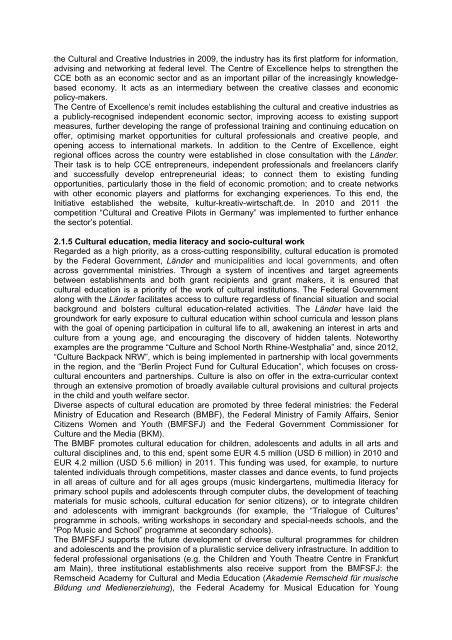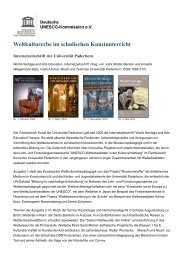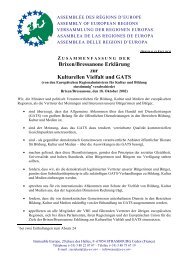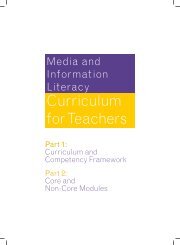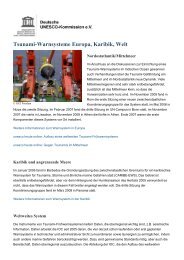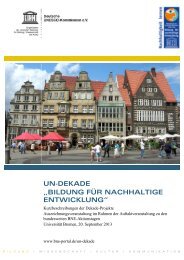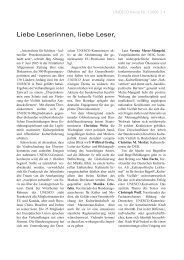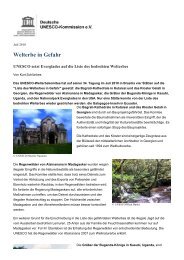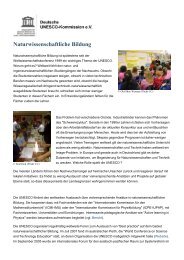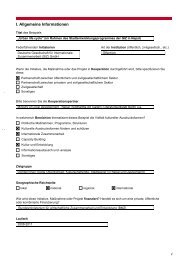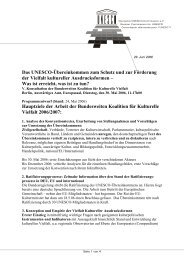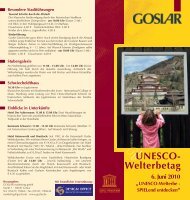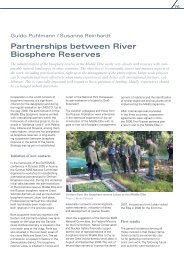Annex Form - Deutsche UNESCO-Kommission
Annex Form - Deutsche UNESCO-Kommission
Annex Form - Deutsche UNESCO-Kommission
You also want an ePaper? Increase the reach of your titles
YUMPU automatically turns print PDFs into web optimized ePapers that Google loves.
the Cultural and Creative Industries in 2009, the industry has its first platform for information,<br />
advising and networking at federal level. The Centre of Excellence helps to strengthen the<br />
CCE both as an economic sector and as an important pillar of the increasingly knowledgebased<br />
economy. It acts as an intermediary between the creative classes and economic<br />
policy-makers.<br />
The Centre of Excellence’s remit includes establishing the cultural and creative industries as<br />
a publicly-recognised independent economic sector, improving access to existing support<br />
measures, further developing the range of professional training and continuing education on<br />
offer, optimising market opportunities for cultural professionals and creative people, and<br />
opening access to international markets. In addition to the Centre of Excellence, eight<br />
regional offices across the country were established in close consultation with the Länder.<br />
Their task is to help CCE entrepreneurs, independent professionals and freelancers clarify<br />
and successfully develop entrepreneurial ideas; to connect them to existing funding<br />
opportunities, particularly those in the field of economic promotion; and to create networks<br />
with other economic players and platforms for exchanging experiences. To this end, the<br />
Initiative established the website, kultur-kreativ-wirtschaft.de. In 2010 and 2011 the<br />
competition “Cultural and Creative Pilots in Germany” was implemented to further enhance<br />
the sector’s potential.<br />
2.1.5 Cultural education, media literacy and socio-cultural work<br />
Regarded as a high priority, as a cross-cutting responsibility, cultural education is promoted<br />
by the Federal Government, Länder and municipalities and local governments, and often<br />
across governmental ministries. Through a system of incentives and target agreements<br />
between establishments and both grant recipients and grant makers, it is ensured that<br />
cultural education is a priority of the work of cultural institutions. The Federal Government<br />
along with the Länder facilitates access to culture regardless of financial situation and social<br />
background and bolsters cultural education-related activities. The Länder have laid the<br />
groundwork for early exposure to cultural education within school curricula and lesson plans<br />
with the goal of opening participation in cultural life to all, awakening an interest in arts and<br />
culture from a young age, and encouraging the discovery of hidden talents. Noteworthy<br />
examples are the programme “Culture and School North Rhine-Westphalia” and, since 2012,<br />
“Culture Backpack NRW”, which is being implemented in partnership with local governments<br />
in the region, and the “Berlin Project Fund for Cultural Education”, which focuses on crosscultural<br />
encounters and partnerships. Culture is also on offer in the extra-curricular context<br />
through an extensive promotion of broadly available cultural provisions and cultural projects<br />
in the child and youth welfare sector.<br />
Diverse aspects of cultural education are promoted by three federal ministries: the Federal<br />
Ministry of Education and Research (BMBF), the Federal Ministry of Family Affairs, Senior<br />
Citizens Women and Youth (BMFSFJ) and the Federal Government Commissioner for<br />
Culture and the Media (BKM).<br />
The BMBF promotes cultural education for children, adolescents and adults in all arts and<br />
cultural disciplines and, to this end, spent some EUR 4.5 million (USD 6 million) in 2010 and<br />
EUR 4.2 million (USD 5.6 million) in 2011. This funding was used, for example, to nurture<br />
talented individuals through competitions, master classes and dance events, to fund projects<br />
in all areas of culture and for all ages groups (music kindergartens, multimedia literacy for<br />
primary school pupils and adolescents through computer clubs, the development of teaching<br />
materials for music schools, cultural education for senior citizens), or to integrate children<br />
and adolescents with immigrant backgrounds (for example, the “Trialogue of Cultures”<br />
programme in schools, writing workshops in secondary and special-needs schools, and the<br />
“Pop Music and School” programme at secondary schools).<br />
The BMFSFJ supports the future development of diverse cultural programmes for children<br />
and adolescents and the provision of a pluralistic service delivery infrastructure. In addition to<br />
federal professional organisations (e.g. the Children and Youth Theatre Centre in Frankfurt<br />
am Main), three institutional establishments also receive support from the BMFSFJ: the<br />
Remscheid Academy for Cultural and Media Education (Akademie Remscheid für musische<br />
Bildung und Medienerziehung), the Federal Academy for Musical Education for Young


